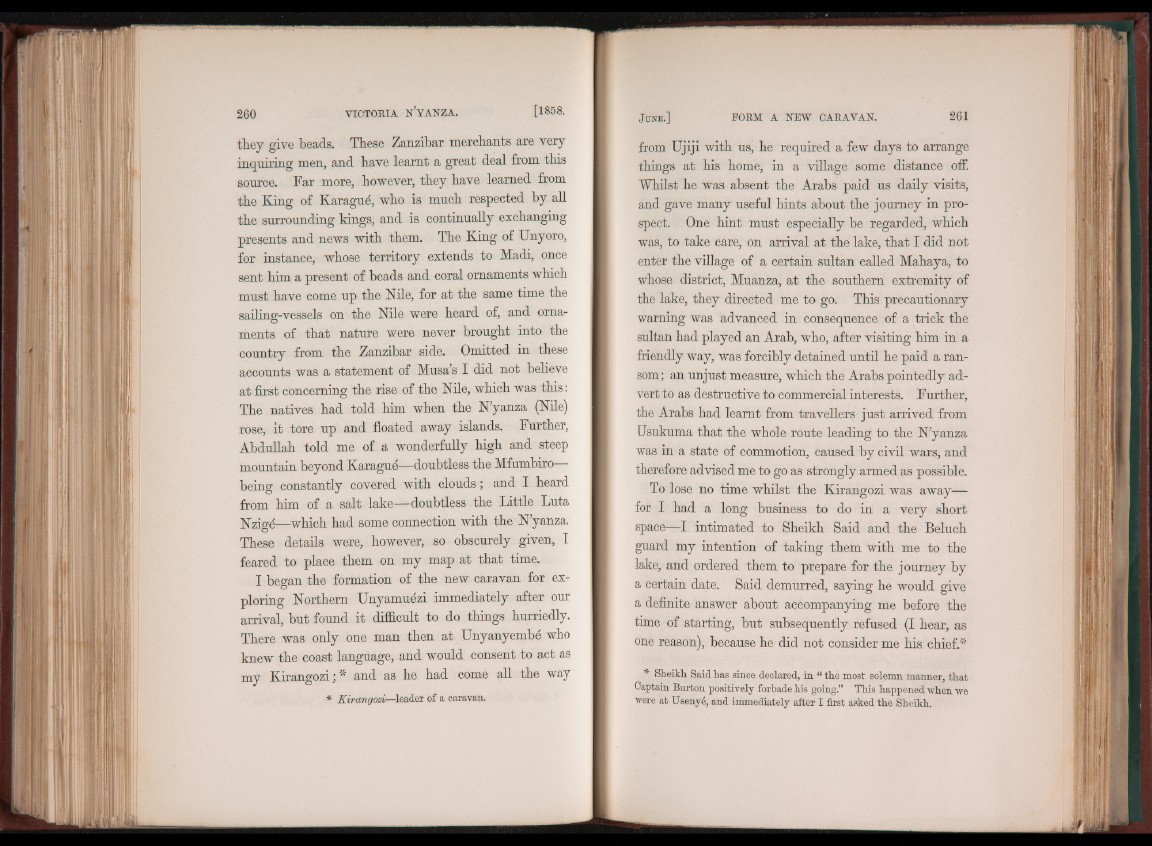
they give beads. These Zanzibar merchants are very
inquiring men, and have learnt a great deal from this
source. Far more, however, they have learned from
the King of Karagud, who is much respected by all
the surrounding kings, and is continually exchanging
presents and news with them. The King of Unyoro,
for instance, whose territory extends to Madi, once
sent bim a present of beads and coral ornaments which
must have come up the Nile, for at the same time the
sailing-vessels on the Nile were heard of, and orna-
ments of that nature were never brought into the
country from the Zanzibar side. Omitted in these
accounts was a statement of Musa’s I did not believe
at first concerning the rise of the Nile, which was this:
The natives had told him when the N’yanza (Nile)
rose, it tore up and floated away islands. Further,
Abdullah told me of a wonderfully high and steep
mountain beyond Karague—doubtless the Mfumbiro
being constantly covered with clouds; and I heard
from him of a salt lake—doubtless the Little Luta
ISTzigp,—which had some connection with the N’yanza.
These details were, however, so obscurely given, I
feared to place them on my map at that time.
I began the formation of the new caravan for exploring
Northern Unyamuezi immediately after our
arrival, but found it difficult to do things hurriedly.
There was only one man then at Unyanyembe who
knew the coast language, and would consent to act as
m y Kirangozi; * and as he had come all the way
* Kirangozi—leader of a caravan.
from Ujiji with us, he required a few days to arrange
things at his home, in a village some distance off.
Whilst he was absent the Arabs paid us daily visits,
and gave many useful hints about the journey in prospect.
One hint must especially be regarded, which
was, to take care, on arrival at the lake, that I did not
enter the village of a certain sultan called Mahaya, to
whose district, Muanza, at the southern extremity of
the lake, they directed me to go. This precautionary
warning was advanced in consequence of a trick the
sultan had played an Arab, who, after visiting him in a
friendly way, was forcibly detained until he paid a ransom;
an unjust measure, which the Arabs pointedly advert
to as destructive to commercial interests. Further,
the Arabs had learnt from travellers just arrived from
Usukuma that the whole route leading to the N’yanza
was in a state of commotion, caused by civil wars, and
therefore advised me to go as strongly armed as possible.
To lose no time whilst the Kirangozi was away—
for I had a long business to do in a very short
space—I intimated to Sheikh Said and the Beluch
guard my intention of taking them with me to the
lake, and ordered them to prepare for the journey by
a certain date. Said demurred, saying he would give
a definite answer about accompanying me before the
time of starting, but subsequently refused (I hear, as
one reason), because he did not consider me his chief.*
* Sheikh. Said has since declared, in “ the most solemn manner, that
Captain Burton positively forbade his going.” This happened when we
were at Useny6, and immediately after I first asked the Sheikh.